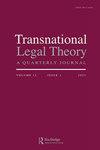国家平等的政治理论
Q2 Social Sciences
引用次数: 0
摘要
摘要本文提出了一个新颖的论点来解释为什么国家在法律上是平等的。它包含了对合法国家的根本政治理解,通过这种理解,国家提供了政治发生的重要“焦点”和“论坛”。在此基础上,它认为,在承认国家构成“政治共同体”并值得一定程度的尊重之前,国家平等是不可能被正确把握的。正是这一方面奠定了法律平等的基础。从相关意义上讲,政治共同体既不需要民主合法,也不需要特别公正。有道德价值的政治通常是对不公正和非法行为的回应。然而,国家平等的规范核心在于国家为这种独特的人类活动形式提供的结构性支持。本文章由计算机程序翻译,如有差异,请以英文原文为准。
A political theory of state equality
ABSTRACT This paper advances a novel argument for why states are juridically equal. It embraces a fundamentally political understanding of legal statehood, whereby states provide essential ‘focuses’ and ‘forums’ through which politics can take place. On this basis, it contends that state equality cannot be properly grasped until it is acknowledged that states constitute ‘political communities’ and merit a certain degree of respect as such. It is this respect that grounds juridical equality. Political communities, in the relevant sense, need not be either democratically legitimate or particularly just. Ethically valuable politics typically operates as a response to injustice and illegitimacy. However, the normative core of state equality lies in the structural support that states provide for this distinct form of human activity.
求助全文
通过发布文献求助,成功后即可免费获取论文全文。
去求助
来源期刊

Transnational Legal Theory
Social Sciences-Law
CiteScore
2.10
自引率
0.00%
发文量
7
期刊介绍:
The objective of Transnational Legal Theory is to publish high-quality theoretical scholarship that addresses transnational dimensions of law and legal dimensions of transnational fields and activity. Central to Transnational Legal Theory''s mandate is publication of work that explores whether and how transnational contexts, forces and ideations affect debates within existing traditions or schools of legal thought. Similarly, the journal aspires to encourage scholars debating general theories about law to consider the relevance of transnational contexts and dimensions for their work. With respect to particular jurisprudence, the journal welcomes not only submissions that involve theoretical explorations of fields commonly constructed as transnational in nature (such as commercial law, maritime law, or cyberlaw) but also explorations of transnational aspects of fields less commonly understood in this way (for example, criminal law, family law, company law, tort law, evidence law, and so on). Submissions of work exploring process-oriented approaches to law as transnational (from transjurisdictional litigation to delocalized arbitration to multi-level governance) are also encouraged. Equally central to Transnational Legal Theory''s mandate is theoretical work that explores fresh (or revived) understandings of international law and comparative law ''beyond the state'' (and the interstate). The journal has a special interest in submissions that explore the interfaces, intersections, and mutual embeddedness of public international law, private international law, and comparative law, notably in terms of whether such inter-relationships are reshaping these sub-disciplines in directions that are, in important respects, transnational in nature.
 求助内容:
求助内容: 应助结果提醒方式:
应助结果提醒方式:


